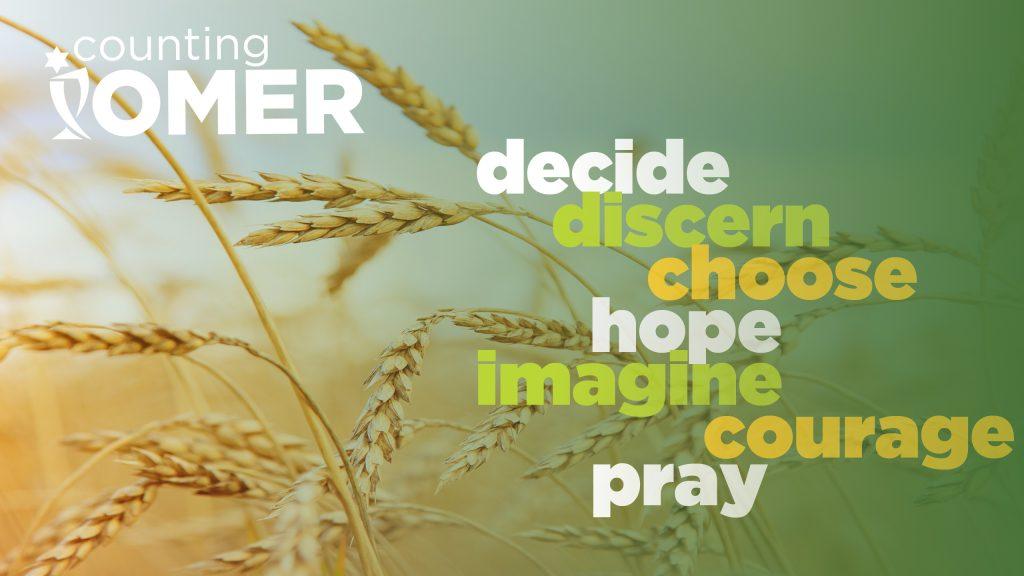The Omer is the 49-day period between the celebration of Passover and the Festival of Shavuot. Beginning with Passover’s celebration of our liberation from Egypt, it became the custom to count the 49 days of the grain harvest leading to Shavuot, marking each step in our journey to Mount Sinai to receive the gift of Torah and revelation.
Temple Beth El will mark the counting of the Omer this year through the wisdom of Rabbi Karyn Kedar’s book Omer: A Counting. Each of the seven weeks of the Omer will focus on a theme related to growing our spiritual awareness and liberating ourselves from all that keeps us from feeling a sense of spiritual wholeness.
This week’s theme is DISCERN.

Sort through the advice of friends and the echoes of your parents. Understand what helps and what doesn’t and sort, choosing what to keep, what to discard. Question your well-guarded assumptions, and challenge the pervasive fear of doing the wrong thing. Discernment is clarity. It is fine-tuning. It is guidance. It is trusting intuition over fear, listening to the gentle fluttering of longing and to the whispers of the soul. It is self-reliance. It is the utter denial of negativity and the commitment to positive thinking. And yet, discernment is not dogmatic; there are a myriad of possibilities to self-actualize, to discover purpose, to have a meaningful life, to impact our world, making it safer and more compassionate.
בָּרוּךְ אַתָּה יְיָ אֱלֹהֵֽינוּ מֶֽלֶךְ הָעוֹלָם, אֲשֶׁר קִדְּשָֽׁנוּ בְּמִצְוֹתָיו, וְצִוָּֽנוּ עַל סְפִירַת הָעֹֽמֶר
Baruch Ata Adonai Eloheinu Melech HaOlam Asher Kidshanu B’Mitzvotav V’Tzivanu Al Sefirat HaOmer.
Blessed are You, Adonai our God, Ruler of the Universe, who sanctifies us with mitzvot, and commands us concerning the counting of the Omer.
Whatever anyone else says or does, I must be true to myself, just as if gold or emerald or the color purple would day, “Whatever anyone may do or say, I must be an emerald and keep my color.” In the universe, respect the highest power, namely the creative force that directs and makes use of all things. In the same way you must respect the highest power in yourself, for it is of the same creative kind.
For this is what makes use of the rest of you, and directs your life.
The Spiritual Teachings of Marcus Aurelius
translated by Mark Forstater
Questions to Consider:
- How might you recognize the best parts of yourself?
- In what ways might you honor the highest powers in yourself?
We often say the right thing, and then find ourselves resenting having to do the right thing. Talk is cheap, however; our behavior is what truly defines us. Listen carefully to your speech; say only what you mean, and do everything you say.
This requires you to slow down your normal pace of communication. So often we talk just to talk. We say things for the sake of saying things. We exaggerate to make what we say more interesting. We promise things before we have determined whether or not we can fulfill the promise.
Ask yourself three questions before you speak:
- Is it true?
- Is it kind?
- Is it necessary?
Rabbi Rami Shapiro,
The Sacred Art of Lovingkindness: Preparing to Practice
Questions to Consider:
- What do we need to do in order to think more carefully about the words we use?
- How can communication improve our relationships with ourselves, our communities, and with the Holy One?
Sometimes the mountain
is hidden from me in veils
of cloud, sometimes
I am hidden from the mountain
in veils of inattention, apathy, fatigue,
when I forget or refuse to go
down to the shore or a few yards
up the road, on a clear day,
to reconfirm
that witnessing presence.
“Witness” by Denise Levertov,
in Evening Train
Question to Consider:
- How might we clear the veils of clouds that impact our clarity?
To know when to reach and when to yield takes years of practice, years of prayer. To know when to be still takes even longer.
Rabbi Karyn Kedar
Questions to Consider:
- What guides your decision of when to reach and when to stop?
- How have your processes changed throughout your life?
You can think too much, which is something Dante and his guide, Virgil, discovered on their outing to the Inferno. There were not permitted to pass through one particular threshold until they left all reason and intellect behind. These faculties are useful, in other words, but only up to a point. Beyond that, the door will be barred to us if we attempt to cross by way of reason. No amount of intellectual authority, arrogant confidence, name dropping or ego and ambition pounding on the door demanding to be admitted will allow us passage. Beyond a certain point, faith is the magic lamp and humility the abracadabra.
Faith begins, if it begins at all, where knowledge leaves off.
Gregg Levoy, Callings:
Finding and Following an Authentic Life
Questions to Consider:
- How do we trust our instinct as we make decisions?
- When do you let your soul guide you?
Martin Buber tells this take: “Rabbi Mendel once boasted to his teacher Rabbi Elimelekh that evenings he saw the angel who rolls away the light before the darkness, and mornings the angel who rolls away the darkness before the light. ‘Yes,’ said Rabbi Elimelekh, ‘in my youth I saw that too. Later on you don’t see these things anymore.’”…
Seeing is of course very much a matter of verbalization. Unless I call my attention to what passes before my eyes, I simply won’t see it. It is, as Ruskin says, “not merely unnoticed, but in the full, clear sense of the word, unseen.” My eyes alone can’t solve analogy tests using figures, the ones which show, with increasing elaborations, a big square, then a small square in a big square, then a big triangle, and expect me to find a small triangle in a big triangle. I have to say the words, describe what I’m seeing. If Tinker Mountain erupted, I’d be likely to notice. But if I want to notice the lesser cataclysms of valley life, I have to maintain in my head a running description of the present. It’s not that I’m not observant; it’s just that I talk too much.
Annie Dillard, Pilgrim at Tinker Creek
Questions to Consider:
- When looking out a window, when do you know what to focus your gaze and mind on?
- When going through your day, how do you know what is an important moment?
As a committed Jew, I come to ancient canonical stories, biblical, midrashic or aggadic, with an assumption that I belong to them and they belong to me. I encounter them searching for Torah, that is, for redemptive teaching, and for zikaron, for the collective memory that completes me, that binds me to all who ever have or will claim or been claimed by these stories. What happens, however, when I reach out to stories whose worlds do not permit me to enter, that exclude or distort me? This is the first problem that confronts anyone who attempts to construct a theology of Judaism that includes all the people Israel, men and women. How do we face a story that de/faces some of us and thereby diminishes all of us?
One solution, of course, is not to face it at all. Redemptive teaching can be found in other sources, including uncanonical stories, bubbemeises, “grandmother-tales,” not merely the canonical zaydemeises, “grandfather tales.” But I am not willing to relinquish these problematic grandmother tales. Like Esau, I cry out to them, “Have you only one blessing, father? Bless me too, father.” It is precisely because I believe that these texts have blessings yet to bestow that, like another member of Esau’s blessing-starved family, I will not let them go until they bless me. I will not abandon traditional texts, and I will not absolve them of moral responsibility.
As the saying goes, “Faced with two alternatives, always choose the third.”
Rachel Adler, Engendering Judaism
Question to Consider:
- When faced with no good options, how do you make a decision?








